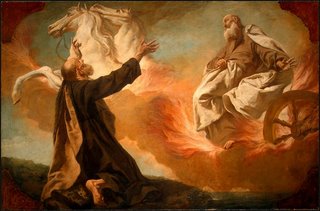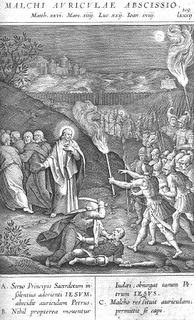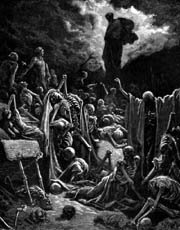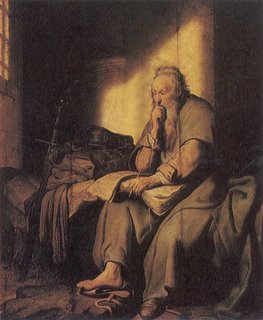
"WHERE are ENOCH and ELIJAH?"
Enoch was translated that he should not see death. Elijah went up by a whirlwind into heaven. Yet the Bible reveals they are not in heaven today! WHERE ARE THEY? Here's the astounding truth.
Where Is Enoch?
ENOCH was "translated." Where did he go? Was he immediately taken to heaven? NO! Because Jesus Himself said: "No man hath ascended up to heaven, but he that came down from heaven, even the Son of man" (John 3:13).
Enoch Walked with God
At the age of 65 Enoch had a son named Methuselah. "And Enoch walked with God after he begat Methuselah three hundred years, and he begat sons and daughters" (Genesis 5:22).
Here was a man that PLEASED God, a man that WALKED WITH GOD.Enoch had to have faith, for in Hebrews 11:6 the Apostle said, "But without faith it is impossible to PLEASE Him: for he that cometh to God must believe that He is, and that He is a rewarder of them that diligently seek Him." So Enoch walked with God. He obeyed God, and followed Him in His paths BY FAITH.No one can walk with God unless he is in agreement with the will of God and doing it. Amos the prophet said: "Can two walk together, except they be agreed?" (Amos 3:3.) So in his generation Enoch was the only recorded person who followed the ways of God—even though it possibly took him sixty-five years to learn to walk with God!
But how long did Enoch walk with God? The Scripture says that he "walked with God after he begat Methuselah three hundred years." So Enoch followed God’s ways for three hundred years. Notice that Moses did not record that Enoch is still walking with God. The Scripture says that Enoch WALKED with God for three hundred years and not one year more! Then Enoch is not still walking with God! Why?
Because "all the days of Enoch were three hundred sixty-five years" (Gen. 5:23). All the days of Enoch were three hundred and sixty-five years. Not just part of his days, but all his days! If Enoch did not die—if he was changed to immortality—and thus continued to walk with God, then his days would have been more than three hundred and sixty-five years. But the Bible plainly says that ALL his days were just that many, and no more!This expression "all his days" is used in the same fifth chapter of Genesis about a dozen times and always it means that the person lived for that length of time ONLY "and he died." So Enoch lived NO MORE than three hundred and sixty-five years because "all his days were three hundred and sixty-five years." As he lived only for this length of time THEN HE MUST HAVE DIED!
But what about his translation? Does that mean he didn’t die?
That’s what most people carelessly assume without proof
What Really Happened at Enoch’s Translation!
Remember, Moses didn’t write that Enoch did not die. Rather Moses wrote that "Enoch walked with God: and he was not; for God took him" (Gen. 5:24). Paul records the same event by saying that he "was not found, because God had translated him" (Heb. 11:5).Thus the Scripture records that Enoch was not found because God took him, or "translated" him. THE BIBLE DOES NOT SAY THAT ENOCH WENT TO HEAVEN when he was translated. Instead it says he was not found.
Certainly Enoch was "translated," but what does the word "translate" mean?
Strange as it may seem, nowhere in all the Bible does "translate" mean to make immortal!
The original Greek word for "translate" is metatithemi. According to Strong’s Concordance it signifies: transfer, transport, exchange, change sides.
The same Greek word is rendered "carried over" in Acts 7:16. Here we read that after Jacob DIED his body was "carried over"—transported, TRANSLATED—to Sychem WHERE HE WAS BURIED! That’s what your Bible says! Jacob was transported or TRANSLATED to the place of burial!
That is why Moses said that God TOOK Enoch. God removed—translated—him so that he was not found. God took Enoch and buried him! In Deuteronomy 34:6 we read also how God took Moses from the people after which he died and was buried by God. "But no man knoweth his sepulcher unto this day." God removed Moses—God translated him—and he was not found either! So Enoch was not made immortal after all! He was taken away and was not found. ALL his days were three hundred and sixty-five! That’s as long as Enoch lived.
Notice another proof that "translate" does not mean to make immortal. It is found in Col. 1:13: the Father "hath delivered us from the power of darkness, and hath TRANSLATED us into the kingdom of His dear Son." Here the Bible says that Christians are already translated—but Christians still die! We are not immortal bodies, but mortal flesh and blood. Although we were once part of the darkness of this world, now we are TRANSLATED, removed from darkness into the light of the kingdom of God.
He Didn’t Receive the Promise
Enoch is included by Paul (in Hebrews 11) among the fathers who obtained a good report through faith; but "ALL these, having obtained a good report through faith, received not the promise" (Heb. 11:39). What promise? The "hope of eternal life, which God, that cannot lie, promised before the world began (Titus 1:2).
So Enoch therefore is one of "ALL THESE" who have not yet obtained the promise of eternal life and inheritance. Enoch and all the worthies of old will receive the promise of eternal life at the return of Christ, the same time Christians obtain it (Heb. 11:40). That is yet future!
Since Enoch has not yet inherited eternal life he must be dead! This is exactly what Paul writes in Heb. 11:13! Paul says Enoch DIED! Notice it! "These ALL died in faith, not having received what was promised:’ Who were these "ALL"?Paul tells us: Abel, ENOCH, Noah, and the patriarchs and their wives. Hebrews 11:1-12 lists those who had faith and Enoch is included among them. Then in verse 13 Paul proved that they had not inherited the promises by saying: "These ALL [including Enoch] died in faith" But what about Paul’s saying that Enoch "should not see death"?
Which Death Did Enoch Escape?
Enoch lived only three hundred sixty-five years. Then what could Paul possibly have meant by saying: "By faith Enoch was translated that he should not see death; and was not found because God had translated him?" This verse nowhere says that Enoch did not die. Rather, it says that Enoch "should not see death." But what does it mean? Remember, there is more than one death mentioned in the Bible. There is a first death, and there is a second death (Rev. 20:6). Which death did Paul mean? The first death is appointed unto men (Heb. 9:27). That death cannot be humanly evaded. It is inevitable. That death Enoch died, as we have already proved. But Paul was not writing about that death. The phrase "should not see" is in the conditional tense of the verb, having reference to a future event. It is not in the past tense, that he "did not see" death—but that he "should not see death." So this death that Enoch escaped by being translated is one that he can escape in the future ON CERTAIN CONDITIONS!
Did Jesus ever speak of a death that might be escaped? He certainly did! In John 8:51 Jesus said, "Verily, verily, I say unto you, If a man keep my sayings, he shall never see death "—shall never see— that is, suffer—the second death! And again in John 11:26, "Whoso liveth and believeth in me shall never die"—or "shall not die forever." This death is one that can be escaped on condition that men keep the sayings of Jesus and believe Him. This death is not the first death, because Christians who keep Jesus’ sayings die this first death. Then the death which Enoch should escape must be the second death which will NEVER TOUCH THOSE WHO ARE IN THE FIRST RESURRECTION (Rev. 20:6). And Enoch will be in the first resurrection because he met the conditions!Enoch had faith. He believed God and walked with God, obeying Him. In keeping the sayings of God, Enoch kept the sayings of Jesus too; because Jesus did not speak of Himself, but spoke what the Father commanded Him (John 14:10). Thus Enoch met the conditions so that he should not see death. The second death shall never touch Enoch, because of his faith and obedience.
Two Translations
Now we can understand Hebrews 11:5: "By faith Enoch was translated that he should not see death; and was not found, because God had translated him; for before his translation he had this testimony, that he pleased God." This verse plainly mentions two translations. Examining this verse fact by fact, we notice that Enoch had faith and was translated. This translation—removal, transference—was on condition of FAITH. NOW what translation mentioned in the Bible is on condition of faith? Why, the one we read about in Colossians 1:13. The Father "hath delivered us from the power of darkness, and hath translated us into the kingdom of His dear Son."This is a FIGURATIVE translation—a FIGURATIVE removal or transference from the spiritual darkness of this world to the light of the family or kingdom of God and Christ. In verse 10 Paul shows that to abide in this kingdom we must "walk worthy of the Lord unto all pleasing." This is exactly what Enoch did. He walked with God, and pleased God.Then Enoch, the same as Christians, was delivered from the power of sin and darkness in which he had been living for sixty-five years. He was removed (translated) from the ways of the world and lived three hundred years according to God’s ways so that he might inherit eternal life at Christ’s return, and should not suffer the second death.By faith Enoch was separated—removed or translated—from the world, the same as Christians who are not to be a part of the world, although living in the world.
Not only was Enoch FIGURATIVELY taken from the society of his day, but he was also LITERALLY removed—translated—so that he was not found. God took him physically away from the people, just as He later took Moses. And God buried each so well that neither has ever been found since! Enoch had completed this present normal life. "All his days were three hundred sixty-five years." This was the second translation—a literal removal at death. God gave Enoch this sign of physical removal as a type for all those who should later follow Enoch’s example of faith. He was taken physically from the people just as Christians are to be spiritually removed from the ways of the world. The physical translation or carrying away of Enoch was also a sign to him from God that his faith had been accepted. Like every true saint, Enoch is awaiting the hope of the resurrection and the return of Christ (Jude 14, 15).
Did Elijah Go To Heaven?
You have been told that Elijah went to heaven. Yet over 900 years after Elijah was taken up by a whirlwind Jesus Himself said. "NO MAN ascended up to heaven, but He that came down from heaven, even the Son of man!" (John 3:13.)Is this a Bible contradiction? Did Elijah really ascend to the heaven where God’s throne is—even though Jesus said he didn’t?
If Elijah is not in heaven today, then where did Elijah go?
Which Heaven?
There are three heavens mentioned in the Bible, not just one! And if, as Jesus said, no man, which included Elijah, had ever ascended to the heaven where He came from, then the heaven into which Elijah was taken was a different heaven! Which one was it? The third heaven is the heaven of God’s throne, where Jesus is today. Jesus, being the High Priest of God, is the only one who has the right to be in that heaven with the Father. Notice why! Hebrews 8:1-5 explains that the original earthly tabernacle under the Old Covenant, with its most holy place, or compartment, was the type of the throne of God in heaven. Only the high priest—type of Christ as High Priest now—was allowed to enter!
The second heaven represents the expanse of this great universe—the space where we find the sun, moon, stars, comets and planets. How often do we find the Psalmist admiring the "heavens, the work of Thy fingers, the moon, and the stars, which Thou has ordained" (Psalm 8:3; Genesis 1:15-17).Beside the heaven of the stars, we find that the atmosphere, the air that surrounds this world, is also called heaven. Birds fly "in the midst of heaven"— certainly not God’s throne in heaven—for we read in Genesis 1:20 of "fowl that may fly above the earth in the open firmament of heaven." In blessing Jacob, Isaac said; "God give thee of the dew of heaven:’ and Moses joyed that the "heavens shall drop down dew" (see Gen. 27:28 and Deut. 33:28).This first heaven, from which dew comes, means the atmosphere, where the clouds and the wind roam. Everyone of us is right now breathing the air of heaven!
Since Elijah could not have gone to the heaven of God’s throne, then to which heaven did he go?—for the Scripture reads: "and Elijah went up by a whirlwind into heaven" (II Kings 2:1, 11).The answer ought already be quite obvious! Elijah "went up by a whirlwind into heaven"—not to the heaven of God’s throne, but into this earth’s atmosphere, the first heaven.There could be no whirlwind in any other place but in the atmosphere surrounding this earth—in the first heaven, in which the birds fly. You certainly have seen the great lifting power of a whirlwind, haven’t you?
Why Taken Up?
What was the reason for this unusual act of God? Why did He take Elijah up into the atmosphere? Was it to make him immortal? No! The Scripture says no word about that! The ancient prophets—including Elijah—did not receive any promise of immortality prior to or apart from us. Notice it in Hebrews 11:13 and 39: "These all, having obtained a good report through faith, received not the promise!" And we shall not receive it until Christ returns (Heb. 11:40).
So Elijah was not to be made immortal—for that would give him pre-eminence above Jesus. But what does the Bible reveal as the reason for his removal? II Kings 2:3 and 5 has the answer. Notice now what the sons of the prophets said to Elisha: "Knowest thou that the Lord will take away thy master from thy head today?" Or as the Smith and Goodspeed translation has it, "Do you know that today the Lord is about to take away your master from being your leader?" Christ is the head of the Church today as Elijah was the head or leader of the sons or disciples of the prophets in that day. God had sent Elijah as His prophet to wicked king Ahab and to his son Ahaziah. Now God wanted Elisha to direct His work, as Ahaziah the king had died (II Kings 1-18) and a new king was ruling. So what did God do?He could not allow Elijah to be among the people with Elisha directing the work now. That would have been the same as disqualifying him! God never takes an office from a man when that man has been performing his duty well, the only thing God could do would have been to remove Elijah so that another would fulfill the office. This God did do. When he was taken up, Elijah’s mantle dropped from him and Elisha picked it up. See II Kings 2:12-15.
And what did the "mantle" mean? In Clarke’s Commentary we note that it was "worn by prophets and priests as the simple insignia of their office." (Vol. 2, page 484.) The purpose of God in removing Elijah was to replace him with another man who would occupy Elijah’s office in Israel for another fifty years. This work had to start under a new king, for Ahaziah had just died. And Elijah was already aging. So as not to disqualify Elijah in the sight of the people, God took him away from the sons of the prophets and the people, allowing the mantle which signified the office of Elijah to drop into the hands of Elisha. Thus God preserved the name and office of His prophet.
How Taken Up?
Having crossed Jordan near Jericho, Elijah was taken up by a whirlwind in what appeared to be a chariot and horses of fire. The violent motion of the wind pulled the mantle off the prophet as he was seen to ascend into the sky. You probably remember reading the promise of Elijah that Elisha would have a double portion of the Spirit of God if he would be allowed by God to see Elijah taken up (II Kings 2:9). All this meant that Elisha was to be the leader, the new head of the sons of the prophets.Having ascended into the air, Elijah was borne away out of the sight of the new leader—beyond the horizon. But—
Where Did Elijah Go?
This has been the perplexing problem to so many! He did not ascend to the throne of God. Jesus said so! Yet he couldn’t remain in the air forever. And God did not say that Elijah was to die at that time. If he were, Elisha could have assumed his new office without the removal of Elijah, for we know that Elisha died in office after fulfilling his duty (II Kings 13:14).The sons of the prophets who knew that their master was to be removed also that Elijah was not to die then. That is why they were fearful that the Spirit of God might have allowed him to drop "upon some mountain, or into some valley" (II Kings 2:16). Elisha knew that God would preserve Elijah from falling, but at their insistence he permitted men to go in search for him—to no avail. Elijah was gone! And where to? Certainly the whirlwind used by God could not take him beyond the earth’s atmosphere. Neither does the Bible account leave Elijah in the air!
The Answer Unfolds
Let us notice the next few years and see what further events the Scripture records. The new king of Israel was another son of Ahab, Jehoram, or Joram as he is sometimes called. The beginning of his reign marked the year of the removal of Elijah (II Kings 1:18 and 3:1). During this king’s reign Elisha was the recognized prophet of God (II Kings 3:11). In the fifth year of Joram king of Israel, the son of the king of Judah began to reign along with his father in Judah (II Kings 8:16). His name also was Jehoram. The first thing he did to establish his kingdom rule was to put his relatives to the sword lest they should claim the throne from him (11 Chronicles 2 1:4). For nearly six years he followed the ways of the nations about him and did evil in God’s sight. Almost ten years had now expired since Elijah was taken from the people.
But what do you think was about to happen?
A Letter Comes from Elijah! Yes, after this wicked rule by the Jewish king, God chose Elijah to write a letter and have it sent to the king! The contents of the letter are found in II Chronicles 21:12-15. In part it reads: "Because thou hast not walked in the ways of. . . thy father . - . but hast walked in the way of the kings of Israel.. . and also hast slain thy brethren of thy father’s house, which were better than thyself. . . thou shalt have great sickness by disease."
From the wording of the letter, it is clear that Elijah wrote it after these events had occurred, for he speaks of them as past events, and of the disease as future. Two years after the king became diseased the king died—having reigned only eight short years (II Chronicles 21:18-20).This proves that the letter was written about ten years after Elijah had been taken to another location by the whirlwind.
God used Elijah to convey the message because he was the prophet of God in days of the present king’s father—and the son was not going in the ways of his obedient father, Jehosophat.The letter he had others deliver was recognized as his—proving that he was known to be alive someplace. Just how much longer he lived, the Bible does not reveal. But in that "it is appointed unto men once to die"—Elijah must have died somewhat later. See Hebrews 9:27. All human beings born of Adam, and that includes Elijah, must die—for we read: "In Adam ALL DIE" (I Corinthians 15:22). Elijah was a man "subject to like passions as we are" (James 5:17)...subject to human nature and death! The prophet, being mortal flesh as we are, could not have lived much beyond his seventy years.
To suppose that God gave him the power of an endless life of nearly three thousand years already is to read into the Bible what is not there! He was mortal, subject to death, and after being lifted into the atmospheric heavens, spent the remaining years of his separate life at some little-known location on the earth, living as every human being, before he naturally died.
Was Elijah on the Mount?
The only remaining texts that puzzle people are those relative to the appearance of Moses and Elijah on the Mount of Transfiguration with Jesus. The record of the event is found in Matthew 17:1-9; Mark 9:2-10; Luke 9:28-36. Leaving the mountain, Jesus told his disciples: "Tell the vision to no man (Mat. 17:9)." A vision is not a material reality but a supernatural picture observed by the eyes.
Moses died, and was buried (Deut. 34:5-6). Both he and Elijah were still dead in their graves, but in vision both they and Jesus were seen in the glory of the resurrection—an event to which Moses and Elijah have not yet attained (Heb. 11:39). The vision was granted the disciples after Jesus had spoken of the glory of immortality in the coming kingdom. How plain the Bible is!
Elijah is dead in the dust of the earth awaiting the resurrection of the just. Elijah, some years after being removed in the whirlwind, went to the grave, but will rise again to live forevermore!









